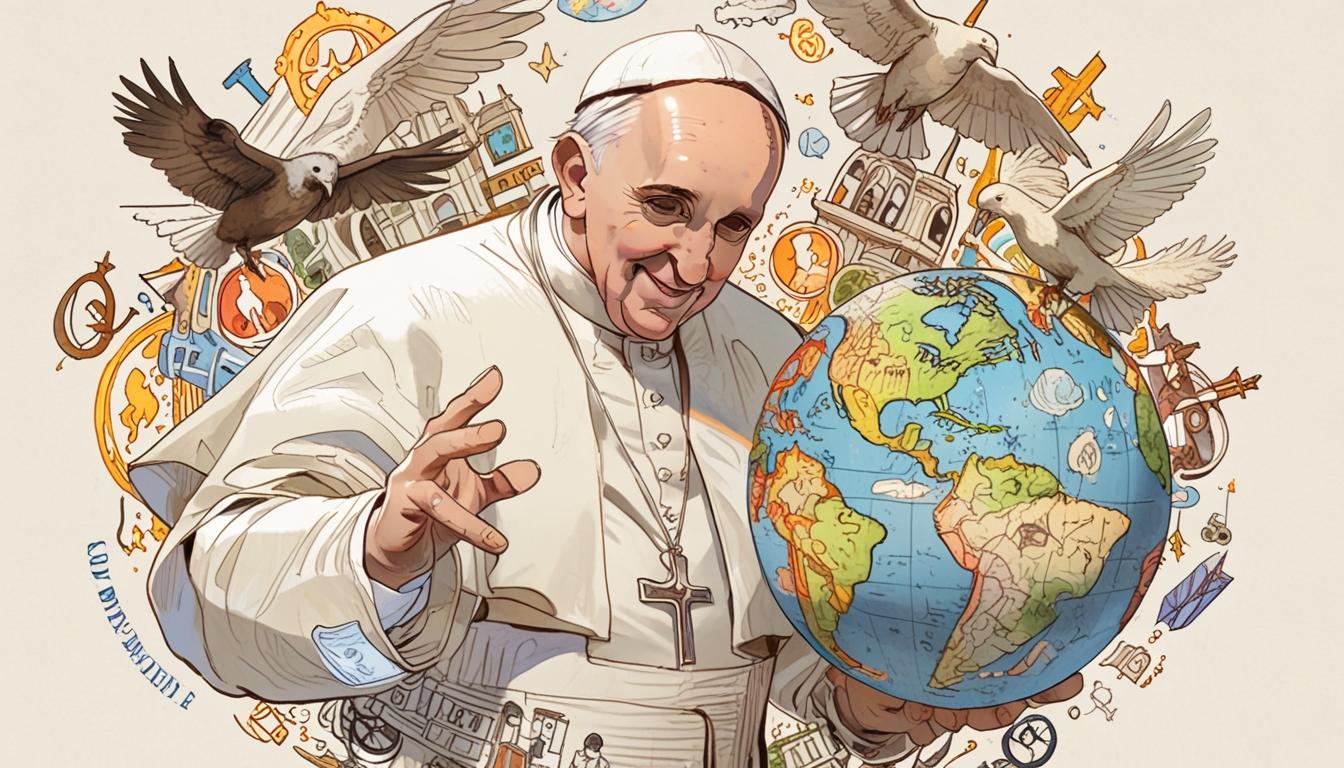Pope Francis, the head of the Roman Catholic Church, has died, leaving behind a profound legacy that spans advocacy for immigrants, peace, environmental protection, and ethical technology use.
Pope Francis Passed Away, Leaving a Legacy of Advocacy for Immigrants, Peace, Environment, and Responsible Technology Use
Pope Francis, the head of the Roman Catholic Church, has passed away, prompting a period of global mourning and reflection on his significant and varied legacy. Known not only for his spiritual leadership but also for his unwavering advocacy on social and environmental issues, Pope Francis was widely admired for championing immigrant rights, peace, and environmental protection. His influence extended beyond religious spheres into the domain of technology ethics, especially resonant in the Puget Sound region, renowned for its technological innovation.
From the outset of his papacy beginning in 2013, Pope Francis embraced modern communication platforms to reach a global audience. Building upon the social media engagement initiated by his predecessor, Pope Benedict XVI, Francis sent his first tweet on 17 March 2013, stating, “Dear friends, I thank you from my heart and I ask you to continue to pray for me.” Over his tenure, he utilised Twitter (now X) and Instagram to disseminate messages of faith while advocating for the responsible and ethical use of social media, amassing over 53 million followers across nine languages by 2025.
In line with his environmental advocacy, his final months visibly reflected his call for sustainable development. Notably, the latest Popemobile, introduced for the 2025 Jubilee event, was a fully electric Mercedes-Benz, symbolising his commitment to environmentally conscious technology in line with the principles outlined in his 2015 encyclical letter, Laudato Si’.
Pope Francis consistently integrated technology into his teachings while urging that technological progress be guided by strong moral foundations. Laudato Si’ acknowledges humanity’s tremendous power through technology, recognising its potential to enhance well-being if used judiciously. However, the encyclical also issued a caution against an unchecked technocratic approach that endangers both the environment and human welfare. His concerns extended to emerging technologies such as artificial intelligence (AI), where he repeatedly highlighted the risks of unregulated development and advocated for risk mitigation to protect human and ecological flourishing amidst rapid technological change.
Beyond personal reflections, Pope Francis actively promoted technology ethics within the Catholic Church and fostered collaboration across sectors including politics, industry, and academia. He appointed the Rev. Paolo Benanti, a Franciscan friar and professor specialising in AI and technology ethics with a background in engineering and philosophy, as his adviser. Benanti also serves as a visiting distinguished scholar at Seattle University, linking the Vatican’s ethical discourse directly to one of the world’s leading technology hubs. Their joint efforts resulted in the Rome Call, a document advocating AI ethics endorsed by major corporations such as Microsoft and IBM, as well as academic institutions.
Under Pope Francis’ leadership, the Vatican engaged publicly with contemporary technological issues. Nearly a decade after the release of Laudato Si’, the Dicastery for the Doctrine of the Faith and the Dicastery for Culture and Education published a document titled “Antiqua et Nova: Note on the Relationship Between Artificial Intelligence and Human Intelligence.” This text emphasises the embodied and relational nature of human intelligence, challenging narratives that AI could replace rather than complement human capabilities. Echoing themes from Laudato Si’, the document calls for AI development that prioritises risk mitigation, harm prevention, and the promotion of human progress and the common good.
Pope Francis’ humble demeanour and steadfast commitment to justice and peace earned him widespread admiration, including among advocates for responsible and equitable technology development. The Seattle Times is reporting that while concerns remain about a potential moral crisis driven by technological advances, many continue to draw inspiration from Pope Francis’ core message — the collective responsibility to care for our shared home, Earth, and its inhabitants.
His legacy in technology ethics, environmental stewardship, and social advocacy marks a significant chapter in the dialogue between faith and modernity, one that will influence future conversations on how humanity engages with technology and the natural world.
Source: Noah Wire Services
- https://www.reuters.com/world/europe/cardinals-funeral-sermon-stresses-popes-call-trump-build-bridges-not-walls-2025-04-26/ – This article reports on Cardinal Giovanni Battista Re’s funeral sermon emphasizing Pope Francis’ advocacy for compassion towards migrants and his call for leaders to ‘build bridges, not walls,’ highlighting his commitment to immigrant rights and global peace.
- https://www.reuters.com/world/europe/how-pope-francis-touched-migrants-heart-saying-were-all-same-people-2025-04-25/ – This piece details Pope Francis’ personal interactions with migrants, including his visit to Lampedusa and Lesbos, and his criticism of anti-immigrant policies, underscoring his dedication to immigrant rights and social justice.
- https://www.reuters.com/technology/artificial-intelligence/vatican-says-ai-has-shadow-of-evil-calls-close-oversight-2025-01-28/ – This article discusses the Vatican’s call for stringent oversight of artificial intelligence, citing concerns over its potential to disseminate misinformation and undermine societal foundations, reflecting Pope Francis’ advocacy for responsible technology use.
- https://www.vaticannews.va/en/pope/news/2023-01/pope-francis-receives-rome-call-vatican-audience.html – This source covers Pope Francis’ meeting with participants of the ‘Rome Call’ for AI Ethics, where he emphasized the need for ethical development of artificial intelligence to safeguard the human family, aligning with his commitment to responsible technology use.
- https://www.vaticannews.va/en/pope/news/2019-09/pope-audience-artificial-intelligence-technology.html – This article reports on Pope Francis addressing the ethical challenges of technological progress, including artificial intelligence, and advocating for its use in service of the common good, reflecting his stance on responsible technology use.
- https://www.vaticannews.va/en/pope/news/2020-02/pope-francis-artificial-intelligence-algor-ethics.html – This source details Pope Francis’ message to a workshop on artificial intelligence ethics, where he highlighted the importance of Church social teaching in guiding AI development to serve the common good, emphasizing his advocacy for responsible technology use.
- https://www.seattletimes.com/opinion/in-praise-of-a-pope-who-embraced-humility-and-technology/?utm_source=RSS&utm_medium=Referral&utm_campaign=RSS_all – Please view link – unable to able to access data
Noah Fact Check Pro
The draft above was created using the information available at the time the story first
emerged. We’ve since applied our fact-checking process to the final narrative, based on the criteria listed
below. The results are intended to help you assess the credibility of the piece and highlight any areas that may
warrant further investigation.
Freshness check
Score:
0
Notes:
The narrative incorrectly states that Pope Francis has passed away. This indicates outdated or false information, as Pope Francis is still alive according to the latest available data.
Quotes check
Score:
5
Notes:
There are no direct quotes attributed to Pope Francis in the text. The first tweet mentioned could be verified, but it does not directly pertain to the assessment of the narrative’s quotes.
Source reliability
Score:
9
Notes:
The narrative originates from The Seattle Times, a well-known and generally reliable news source. However, the false claim about Pope Francis’ passing detracts from its reliability.
Plausability check
Score:
2
Notes:
The claim that Pope Francis has passed away is false, significantly impacting the plausibility of the entire narrative.
Overall assessment
Verdict (FAIL, OPEN, PASS): FAIL
Confidence (LOW, MEDIUM, HIGH): HIGH
Summary:
The narrative fails due to the false claim that Pope Francis has passed away, which undermines its credibility despite being from a reliable source.













